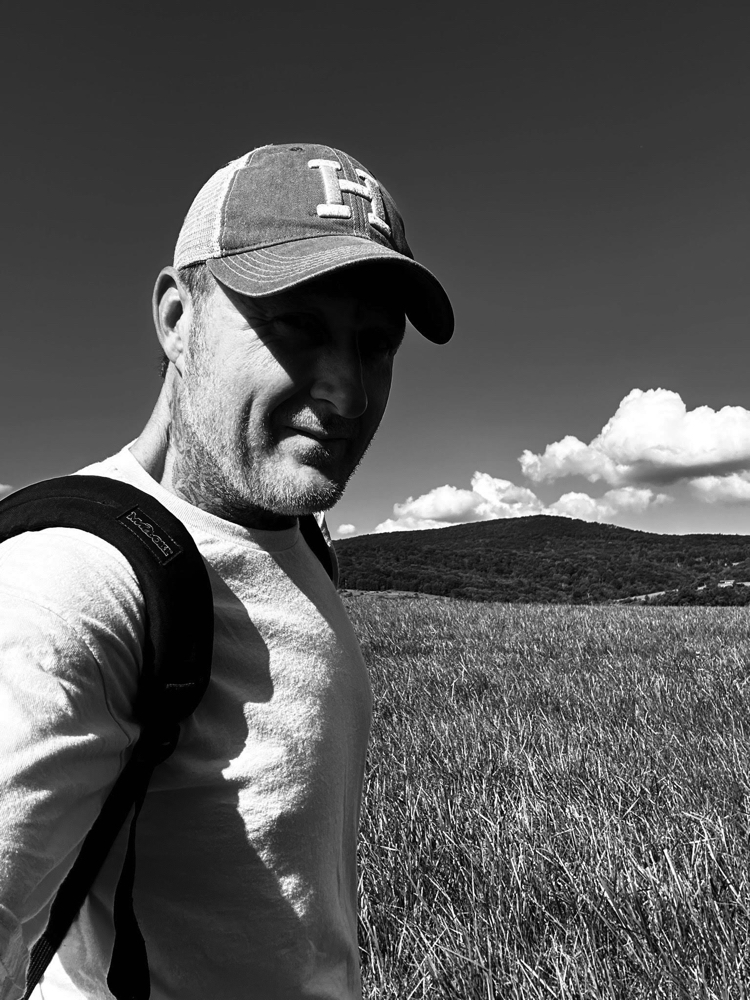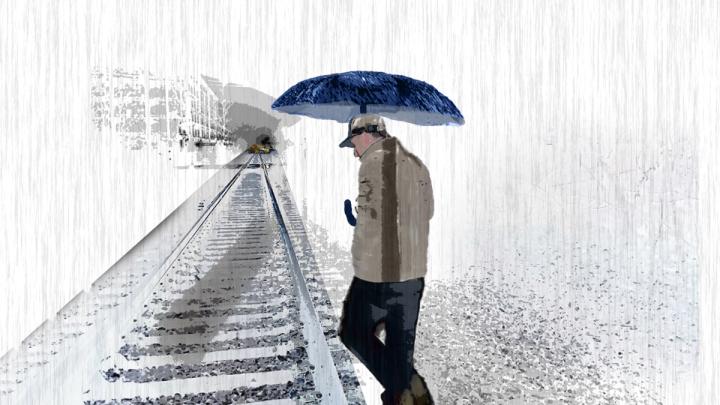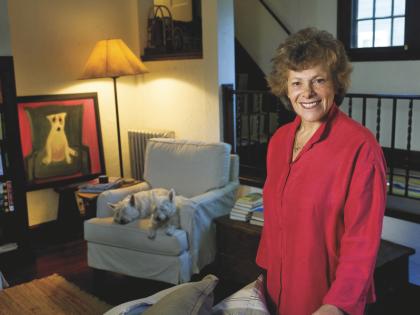After publication of the May-June feature “The Homelessness Public Health Crisis,” Harvard Magazine received an email from Jason Adam Sheets, M.T.S. ’21. A Pushcart Prize-nominated poet and essayist, Sheets earned a B.F.A. from Goddard College in Vermont and studied theopoetics at Harvard Divinity School (HDS). He has written three books of poetry: A Madness of Blue Obsidian, The Hour Wasp, and Theopoetica: An Anthology (all from April Gloaming Publishing); a fourth book of poems will be published this year. He has taught English at the University of New Hampshire and currently teaches for the Poetry in America program, associated with the PBS series of the same name.
Sheets is also homeless. For most of 2023, he slept unsheltered; this year he has been “couch-hopping” with friends in Cambridge, since he still cannot afford a fixed address of his own. In his email, he explained that the stereotype of guaranteed wealth for Ivy League graduates doesn’t always hold true: “If you enter poor, you leave poor,” he wrote. Sheets grew up in Plymouth, Massachusetts, in a lower-income, single-parent household, and after working numerous jobs, including as a steersman on a lobster boat and a taxi driver, he enrolled in college at age 31. Four years later, in 2019, he matriculated at HDS.

In this essay, Sheets reflects on his experience of homelessness, its meaning to him as a person and a poet, and its connection to the wider national crisis.
—The Editors
I cannot remember the exact moment I became homeless. There was not one definitive event that led to my having to sleep beside train tracks or on bathroom floors. I was simply too broke for too long and unable to secure decent-enough employment that could afford me stable housing. I kept trying to save but couldn’t save enough, and before I knew it, I found myself outside one night, aimlessly walking with nowhere to go. Walking for hours each day, or night, has since become habit.
Years ago, I saw a raven for the first time. I was in Vermont attending my inaugural residency as a college undergraduate in a low-residency B.F.A. program in creative writing, four years before I received a full scholarship to study poetry at Harvard. We poets are drawn to crows and ravens, something about the magic in their mystery, so I had always hoped to encounter one. It was fitting that my first encounter occurred when I committed to pursue my calling. Hearing that deep musical caw evoked something within me, something about Emerson’s “long winding train reaching back into eternity” coupled with the difficulty of having both roots and wings.
All of us walk on a ground of many worlds, and we live in a world of many dualities. As a poet, I have each foot planted in a different world, perpetually tasked with distilling the effable from the ineffable without weakening the energy of the encounter. In both of these worlds, though, I’m a homeless Harvard alum—a paradox to most.
Sleeping on gravel is insufferable, but I can tell you how to make a comfortable makeshift bed on it out of practically nothing. Building a fire in the rain by the beach is insufferable, but I can tell you how to build a fire that will create just enough smoke to deter the horseflies from biting you while not drawing the attention of patrol officers. Guarding one’s belongings while homeless is insufferable, but I can tell you how to talk to the agitated drug addicts or untreated Cluster B personalities who fell through the cracks who won’t leave you alone because of something you have that they want, as addiction and mental illness run rampant in the homeless community. (See Lydialyle Gibson’s “Academia’s Absence from Homelessness” for more on this.)
A person’s capacity for experiencing suffering is the same as a person’s capacity for experiencing joy. As a poet, I find joy in words and symbols, and being homeless has gifted me with an abundance of both, which I keep in the front pocket of my life. I’m grateful for words such as home-less, dis-placed, and mis-fortuned. I thank these words, for in each of them, we find not only linguistic duality but the poetic duality—the poison and remedy of interpretation: in homeless we find home, in displaced we find place, and in our misfortune, we can find fortune. If it weren’t for poetry, I know that the experience of homelessness would have long since rusted my psychological gears to a locked state.
On April 30, 2024, I stood outside the gates of Harvard Yard in front of the Smith Campus Center waiting for a man from the City of Cambridge Department of Human Services to arrive and hand me a Verification of Homelessness through the window of his white work van. He pulled up to the corner of Dunster and handed me the document. I thanked him, then carefully placed the piece of paper into my backpack, the same backpack I wore each day from 2019-2021 while at Harvard. Two years ago, I walked across a stage at the graduation exercise for the classes of 2020 and 2021 and shook the hand of the dean of my school as he handed me a large white envelope that symbolized the master’s degree I’d earned. The envelope was empty. (We’d received our degrees in the mail a year earlier due to the COVID-19 lockdown.) When I returned to my friend’s place in Harvard Square, I pulled the Verification of Homelessness from my bag, feeling utterly unsure about how I felt about it. After uploading the photo of it to the places I needed to submit it, I pondered what to do with it and, for a moment, thought of that large white envelope.
There are many myths and stereotypes about being a Harvard graduate, but the one I attempt to reckon with most is the one that presumes that no matter who you are and where you come from, if you hold a degree from Harvard, you are free from having to worry about things such as job security, money, available credit, etc…. This is wishful thinking, especially if you were raised in a check-to-check single-parent household and entered college as an adult FGLI (first-generation, lower-income) student.
The thing about matriculating at Harvard as a working-class person living check-to-check is that you’ll still likely be a working-class person living check-to-check after you graduate, at least for a time, and typically for a longer time than most in your cohort. Like many post-COVID graduates, I’ve spent the past two years submitting countless application portfolios to talent-acquisition teams for positions in my field that, I feel, I’m well-qualified to interview for: research assistantships; instructorships in expository writing; publishing and editing positions; faculty assistantships, etc.—but I’ve yet to receive more than one invitation to interview. It’s important to note, too, that minimum wage employers won’t often hire those in my situation because they know we’re overqualified for their positions and that we’ll likely quit the moment we land the job we truly want; but if you omit your Ivy League credentials altogether from these applications, then the large gap in your employment history is presumed due to things such as jail or drugs. Then there’s the problem of not having a residential address to offer. Either way, you’re perceived as a risk and become stuck in a damned if you do, damned if you don’t situation.
I work two part-time jobs. I teach poetry via Zoom to a number of Title I high schools across the country (Title I is a federal program that provides extra funding to help students in high-poverty schools). This pays roughly $1,000 per month, so I receive roughly $4,000 per semester for this. I work another part-time job as an overnight safety coordinator youth worker for a homeless shelter in Harvard Square. I’d jump at the chance to work full-time at either of these, but the hours simply aren’t there. I’ve authored three books, published countless pieces in reputable and noteworthy journals and magazines, have given guest lectures at community colleges and at Harvard—and the Veritas of my situation is that I currently survive on roughly $23,000 per year. That’s $23,000 a year that some in my situation would kill for. Many homeless people live on much less than that, but most know the importance of having gratitude for every cent that they do have.
I recently had a conversation with a homeless Russian man, a conversation that inspired a poem I included in my next book, V Verse Is I. I’ll never forget how he reminded me to “always look at the shiny side of the coin, because when we find a coin on the ground, it has its shiny side and its dulled side, so always look for the shiny side.” There’s a geometry of gratitude in the poetics of homelessness. (I’ve found a lot of coins since then and always look for the shiny side…)
The last time I saw a raven, I was teaching a class via Zoom on the formal structure of sonnets. It was an orange-vanilla sky morning with a hint of saltwater in the air. I was taking my students for a walk down the train tracks, performatively sharing how the train tracks served as a metaphor for the 14-line limit of the sonnet and how the train symbolized the words of the poem, while the tracks symbolized the structure; expounding how, just as the train would derail if the tracks became warped, the emotional impact of the poem would derail if the structure became warped. We talked about how the “ticket” to attend the sonnet is the attention we pay to it—how we must pay the poem our attention if we’re to experience it the way the energy of its structure intends. I concluded the lecture feeling that it had gone well, and as I bent down to put my laptop back in my backpack, I heard a rich, sonorous caw. The raven was perched on the eave of a large, abandoned warehouse a stone’s throw away. We locked eyes for a long moment before it swooped down and somersaulted midair, moving away from me. The slant of its movement recalled for me the slant one uses when quoting lines of poetry, “a moment’s monument,—/ Memorial from the soul’s eternity . . . / its face reveals/ The soul.” At that moment, I was home with nothing less than all I needed.









